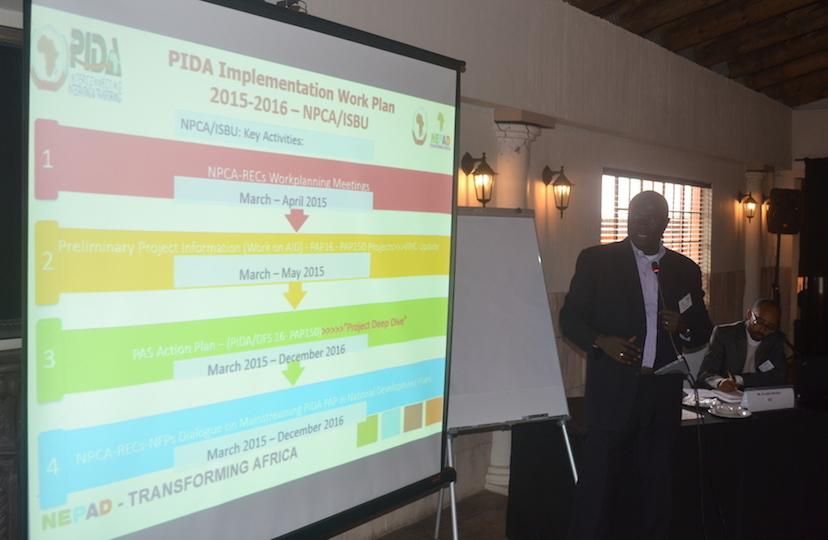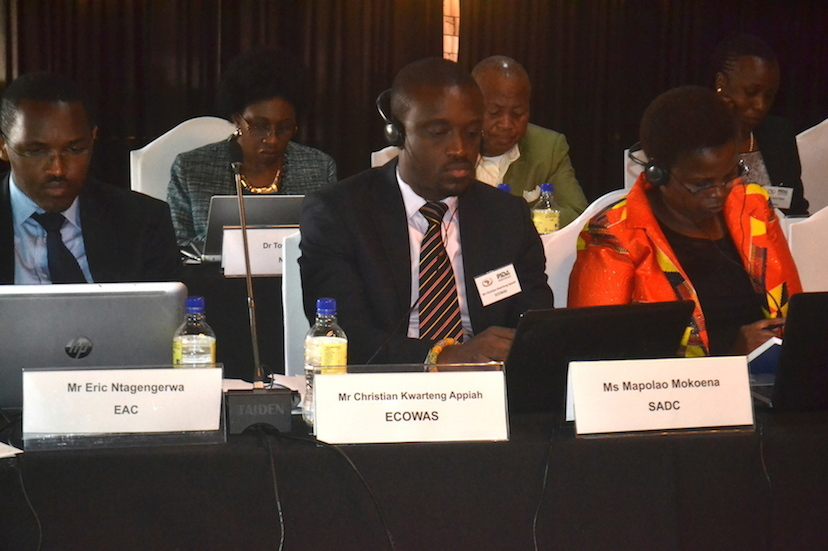Steering Committee commends PIDA progress

|
The Steering Committee of the Programme for Infrastructure Development in Africa (PIDA) concluded a two-day meeting on Friday with a clear roadmap for accelerated implementation of the programme. |
||
|
The meeting was attended by members of the PIDA Steering Committee including the NEPAD Agency, African Union Commission (AUC), African Development and Regional Economic Communities (RECs) as well as other strategic partners of PIDA. The Steering Committee is the highest technical body tasked with fostering overall coordination of PIDA between various stakeholders and provides general policy guidance and facilitation for PIDA implementation.
Head of NEPAD’s Infrastructure Strategic Business Unit (ISBU) Mr Adama Deen highlighted the activities of the PIDA implementation work plan and its achievements since the last Steering Committee meeting. These include a PIDA Service Delivery Mechanism which is a pool of resources used to procure high-quality expertise to provide various support tools to national lead agencies and RECS involved in the implementation of the 51 PIDA priority projects. The projects cover the sectors of energy, transport, trans- boundary water and ICT. Mr Deen also highlighted the progress made since the first disbursement of funds from the AfDB received by the Agency as well as the signing of four performance MoUs with the RECs and the upcoming recruitment of Infrastructure experts within the NEPAD Agency and RECs.
Head of Infrastructure Programme, Mr Adama Deen presenting during the meeting
AUC Director for Infrastructure and Energy Department, Mr Aboubakari Baba Moussa, who chaired the meeting, recognised the integration efforts that have been made by RECs and stressed the need for the steering committee to evaluate what has been achieved to date three years after implementation of projects began. He also highlighted that PIDA is at the heart of Africa’s Agenda 2063, which has endorsed infrastructure development as a key enabler of the continent’s integration. Further to this, the Director commended that all 54 member states of the African Union are fully committed to PIDA and that all five regions of the continent are fully integrated into the PIDA implementation process. Representing the AfDB , Mr Shem Simuyemba commended the partnership between the NEPAD Agency, AUC and AfDB under PIDA which has achieved formidable results in advancing Africa’s infrastructure development. “This partnership has helped to have a coordinated approach in the delivery of PIDA, Africa’s highest infrastructure programme and has been critical in launching the joint Africa50Fund, which will help facilitate large-scale funding from the private sector,” he said.
Representatives from the Regional Economic Communities Both AfDB and German Development Cooperation (GIZ) committed their continued support to the implementation of PIDA through various support mechanisms. These include funding of the PIDA Capacity building projects that will aid skills development in the RECs, NEPAD Agency and AUC. The Steering Committee heard presentations on the Monitoring and Evaluation Reporting system currently being set up by the NEPAD Agency and the AUC to better monitor PIDA progress.
The meeting also took stock of the comprehensive reports from the East African Community (EAC), the Economic Community of West African States (ECOWAS), the Southern African Development Community (SADC) and the Union of Arab Magreb (UMA) on the implementation of the PIDA projects within their regions. A presentation on the Virtual PIDA Information Centre was done and recommendations were made on the improvement of the portal to better serve its purpose of providing information on PIDA activities and projects on the continent. This also is tied in with the Communication Strategy presentation to which members approved the setup of a PIDA Communications Network that will solely be focused on communicating PIDA.
Institutional representatives attending the PIDA Steering Committee Meeting Africa’s engagements in recent global development processes such as the TICAD and the Forum for China Africa Cooperation were also discussed. The meeting yielded key recommendations that will help to successfully implement PIDA at national, regional and continental levels. |




